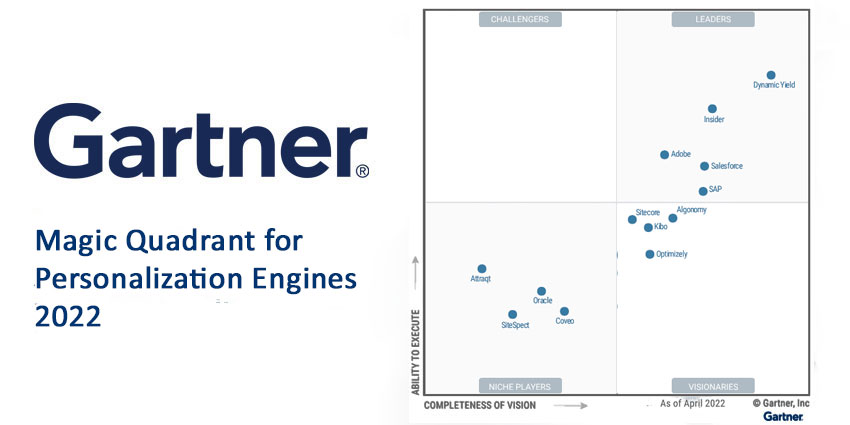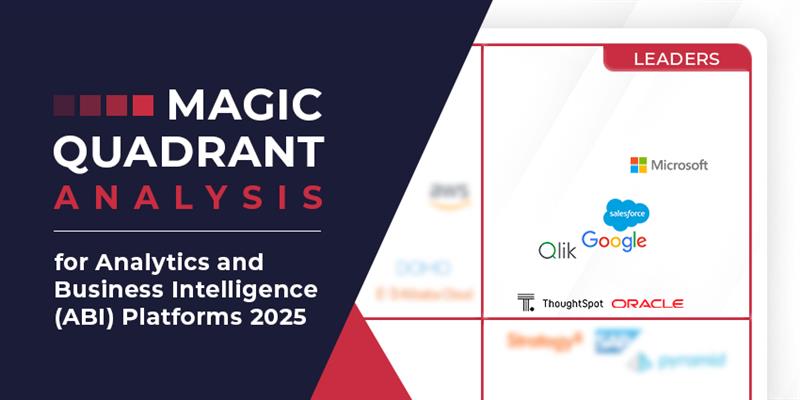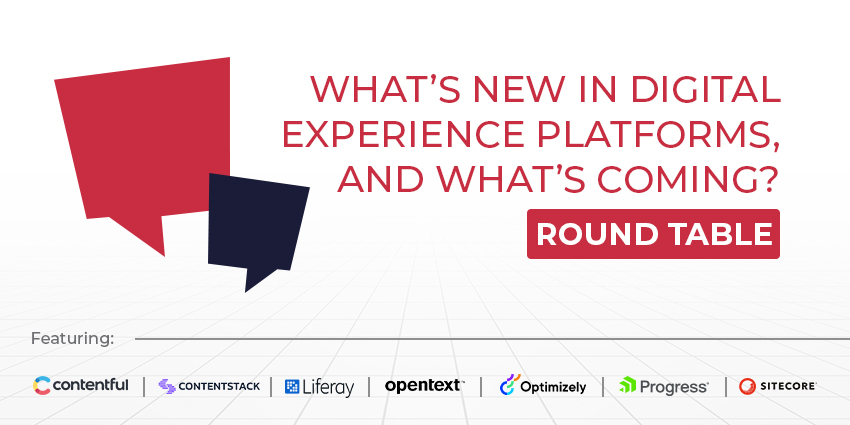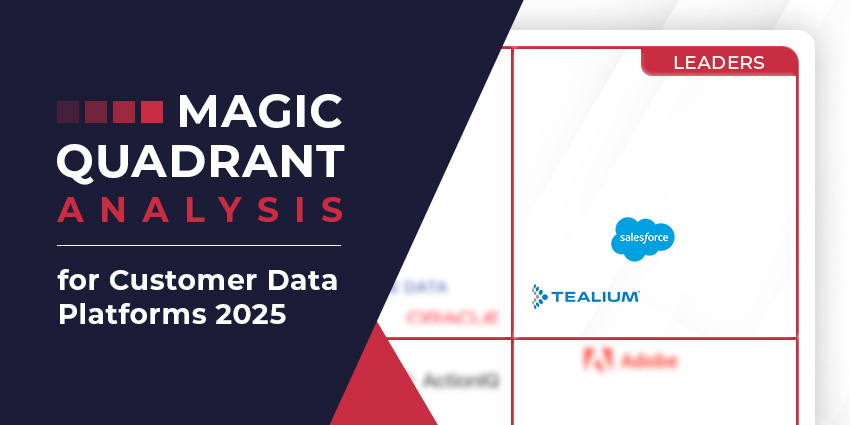Many believe that the companies that best understand their customers and act on that knowledge will win in the digital-first world.
Uninhibited by this belief, hyper-personalization has become much more than a buzz term for digital CX and marketing leaders – it is a critical differentiator.
Yet, there are many ways to personalize customer journeys, such as custom pricing, dynamic recommendations, prepopulating forms, and much more. Personalization engines help to bring many of these use cases to life.
Consequently, personalization engines have many facets. To come to terms with these, here is a closer look at how Gartner defines such solutions.
The Definition of Personalization Engines
According to Gartner, personalization engines allow CX teams to “identify, set up, conduct and measure” the ideal experiences for individual customers.
Such experiences hinge on customer intent, their journey context, and the information a company has stored about them.
Combining these nuggets of knowledge, companies can tailor content, offers, and interactions across many channels to optimize CX.
To facilitate such strategic individualization, Gartner notes each of the following as core capabilities of a personalization engine:
- Behavior tracking, data collection, and ingestion
- Interaction triggers based on a customer’s actions, context, and data
- Flexible user segmentation
- Numerous testing features
- Predictive analytics capabilities
- Personalization performance reporting
While these are the core capabilities, there are further differentiative features of personalization engines that come to light in the assessments of the 13 prominent providers below.
These assessments include some of the strengths and cautions of each vendor, as noted by Gartner, with the analyst separating them into four categories: Leaders, Challengers, Visionaries, and Niche Players.
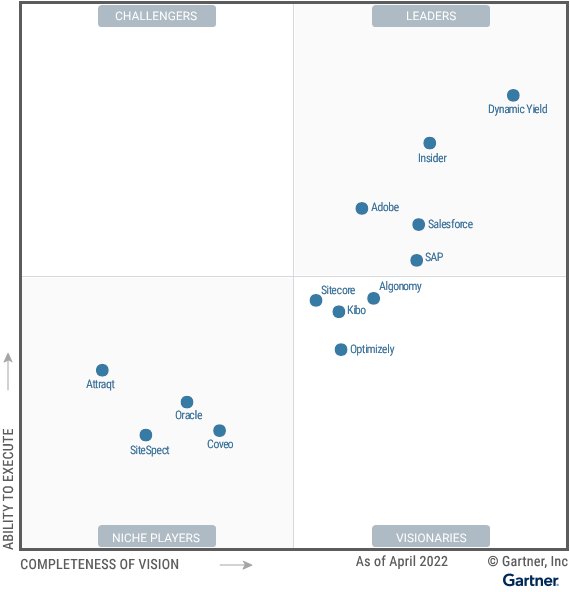
The 2022 Personalization Engine Magic Quadrant Leaders
Showcasing a clear-cut understanding of how to maximize the solution’s value and a commitment to driving customer outcomes, leaders in the magic quadrant couple a track record of delivering value with an innovative vision for the future. In addition, these vendors offer features that require little technical expertise, lowering the workload of IT teams. This year’s leaders are:
- Dynamic Yield
- Insider
- Salesforce
- Adobe
- SAP
Dynamic Yield
Dynamic Yield receives acclaim from Garter for its platform vision, innovation, and stand-alone email personalization. Yet, the analyst seemed particularly taken aback by AdaptML, its deep learning capability, which bolsters the vendor’s predictive analytics capacity. Not only does this enhance testing for personalization initiatives, but also automation, segmentation, and recommendations.
Insider
Insider offers a high-templated approach to personalization, aiming to simplify the deployment of personalization initiatives. Gartner lauds the diversity and configurability of these, while also pinpointing its broad set of reporting capabilities as another critical strength. All this, alongside comprehensive support services, helps Insider secure its place as a market leader.
Salesforce
Salesforce draws from its extensive portfolio to capture real-time customer data and supplement customer profiles. These capabilities supercharge many personalization uses cases, alongside cross-platform decisioning. However, Gartner identifies three further strengths as key differentiators: its robust bandit testing, B2B personalization support, and entry-level offering.
Adobe
Adobe, also a leader in digital experience platforms, powers many of its personalization used cases with its highly-regarded customer data platform. The compatibility of this solution with the Adobe Target personalization tool receives praise from Gartner, enabling sophisticated use cases and analytics. The analyst also highlights targeting and testing as additional strengths of the vendor.
SAP
Many companies worry that personalization sometimes crosses the “creepy line”. SAP offers a differentiated approach to data privacy and deprecation that is central to its personalization approach. While the report does not delve much further, Gartner commends this approach while also lauding the “top-down triggering templates” and reporting features of SAP Emarsys.
The 2022 Personalization Engine Magic Quadrant Challengers
Likely to succeed in the personalization space, challengers in the magic quadrant demonstrate an ability to drive value through specific use cases. Unfortunately, the depth of these use cases lags behind industry leaders, while coordination between products in their portfolios is often lacking. Alternatively, they may trail in innovation, global presence, and sales. This year’s challengers are:
- There are no challengers in this year’s magic quadrant.
The 2022 Personalization Engine Magic Quadrant Visionaries
Putting forward a robust vision for the future of personalization, visionaries in the magic quadrant are thought leaders that offer depth within their solution suites. However, Gartner cautions that they sometimes have “gaps relating to broader functionality requirements” or frictions in client experiences, which cause them to fall behind industry leaders. This year’s visionaries are:
- Algonomy
- Kibo
- Sitecore
- Optimizely
Algonomy
Algonomy offers a journey-builder capability with a drag-and-drop user interface. Through this, the vendor aims to make it easier for brands to build and orchestrate personalized experiences. Gartner seems to admire this concept, noting it is as a critical strength, alongside digital commerce innovation and client success management. Yet, low brand awareness is perhaps stilting its growth.
Kibo
Kibo excels in its digital commerce capabilities, offering innovations such as visual search and a native product finder that asks customers questions to deliver personalized product recommendations. Alongside its targeting and product strategy execution functionalities, Gartner highlights this as a considerable strength. However, the analyst highlights a lack of cross-vertical expertise as a caution.
Sitecore
Sitecore recently acquired Boxever and Reflektion, increasing its personalization capacity. This acquisition strategy draws acclaim from Gartner as the deals expanded the available use cases for prospective buyers. Its pricing structure and Decision Canvas also showcase its ability to innovate to improve client outcomes. Yet, Gartner recommends the vendor sharpens its innovation curve.
Optimizely
Optimizely presents a vision for personalizing customer experiences that Gartner applauds. Such a vision involves tying content creation with deployment, which the analyst believes could “lower the barrier” to personalization at scale. Its support for testing and investment in integrations also draws praise. Nevertheless, Gartner suggests the vendor lacks the AI to compete with market leaders.
The 2022 Personalization Engine Magic Quadrant Niche Players
Niche players frequently perform well across various aspects of the personalization engine space – be it recommendations, reporting, or testing. Yet, they lack depth in platform functionality and geographical presence while often receiving substandard client feedback. This year’s niche players are:
- Oracle
- Coveo
- Attraqt
- SiteSpect
Oracle
Oracle has recently enhanced the capabilities of its Infinity product, lowering time to value across many use cases, including prescriptive recommendations. Singling this out as a significant strength, Gartner also commends the solution’s testing tools and integration with Oracle Service. However, it cautions prospective clients of its multitool workflow, reporting, and roadmap uncertainty.
Coveo
Coveo is a new entrant to the magic quadrant after growing its market presence over the past year. Much of this is perhaps due to strengths such as its personalized service and support, path to client maturity, and product recommendations, as Gartner notes. Yet, the analyst does pinpoint its price as a drawback, alongside weak testing capabilities. A lack of MVT and MAB algorithms indicates this.
Attraqt
The Attraqt Experience Orchestrator (XO) platform leverages AI in many intriguing ways. An excellent example of this is its robust AI-driven merchandising capability, while it also offers optional professional services to make the most of such applications. While these examples showcase its promise, Gartner raises concerns over Attraqt’s personalized service and support resources.
SiteSpect
SiteSpect excels in its customer experience testing and measurement of personalization initiatives, providing a separate site monitoring tool that enables users to diagnose issues quickly. Yet, Gartner notes that it could make the implementation process for its products easier while suggesting that its “wide roadmap” may also deter clients from properly assessing future needs.
What Do You Think Of the Results?
While Gartner names five market leaders, the chart suggests that Dynamic Yield leads the pack, with Insider the only vendor in close proximity.
These companies are well-established but lack the notoriety of Salesforce, Adobe, or Oracle, so this may come as a surprise.
However, the more recognizable names focus on many realms of enterprise technology, so perhaps their intense focus on developing a robust personalization engine shines through.
With that said, it will be interesting to see if the most notable names can close the gap in 2023 and whether other prominent industry players, like Twilio, join the widely-respected report.
Data is critical to unlocking value from personalization programs. Uncover the leading data and analytics services providers by reading our rundown of that 2022 Gartner Magic Quadrant.
